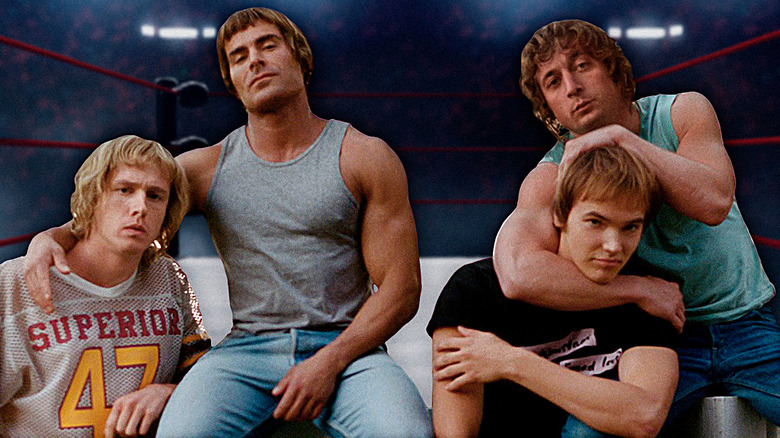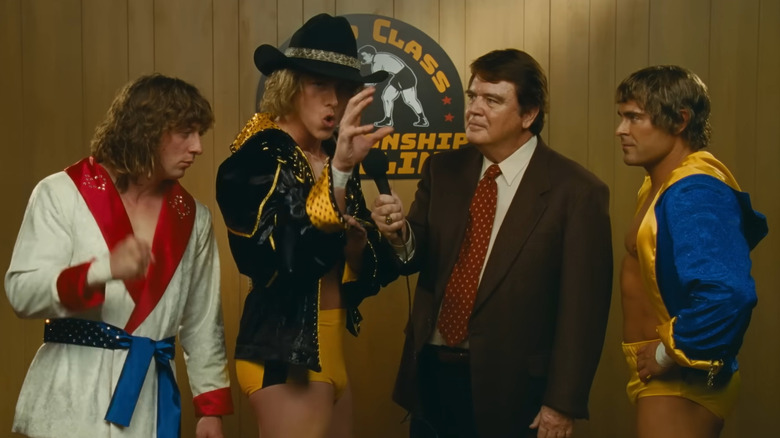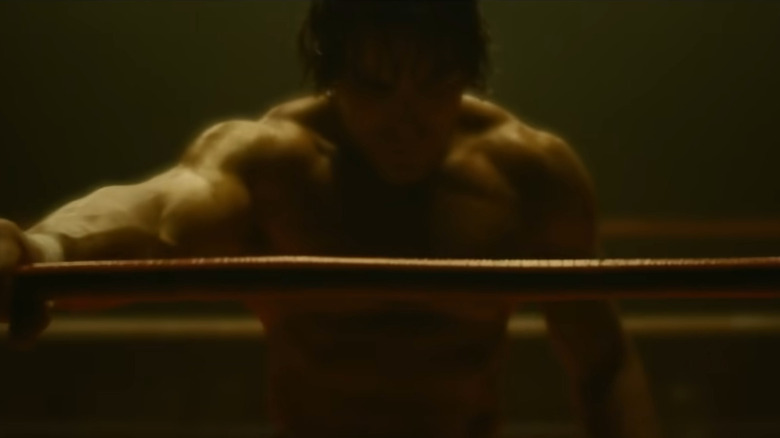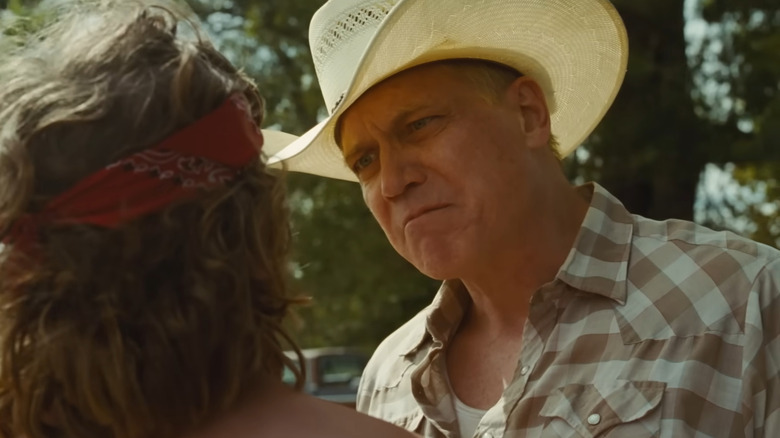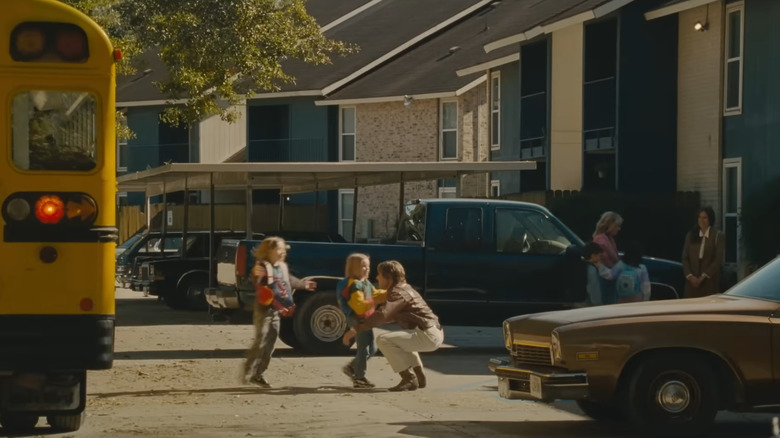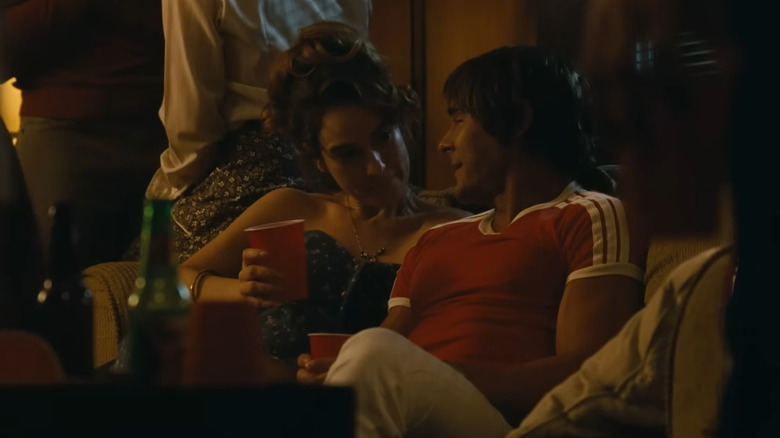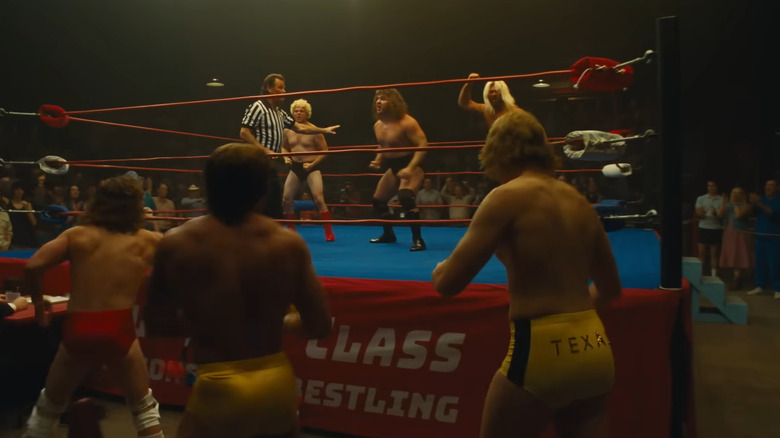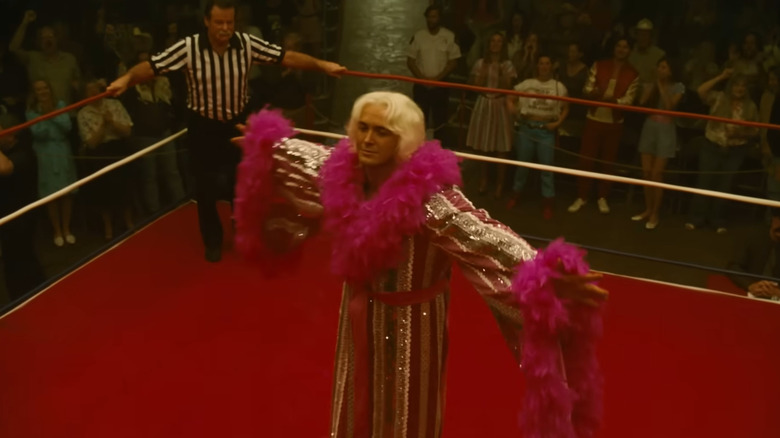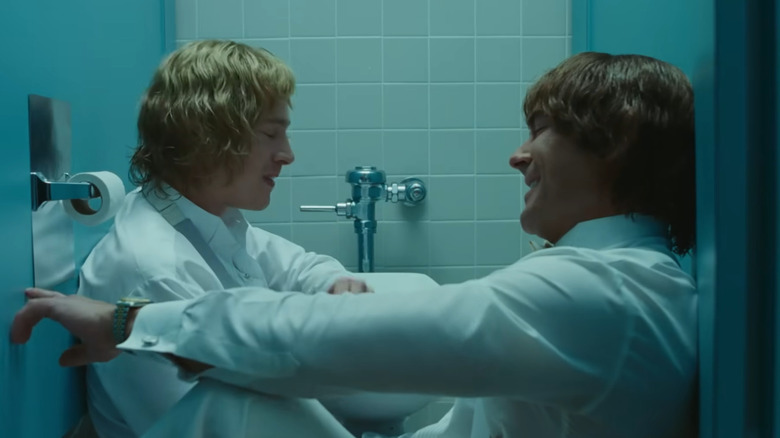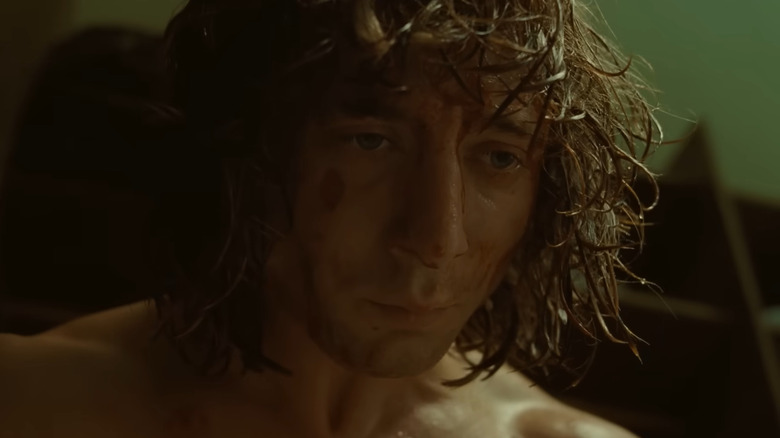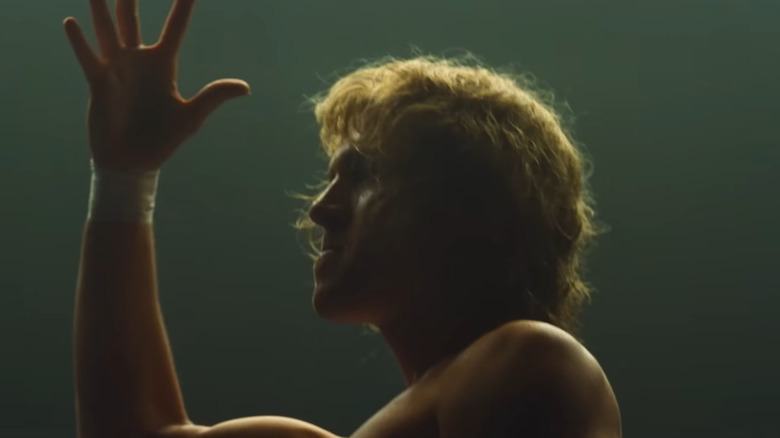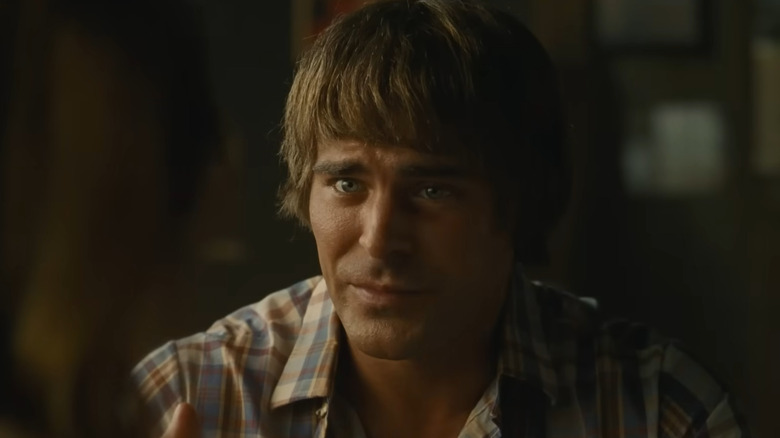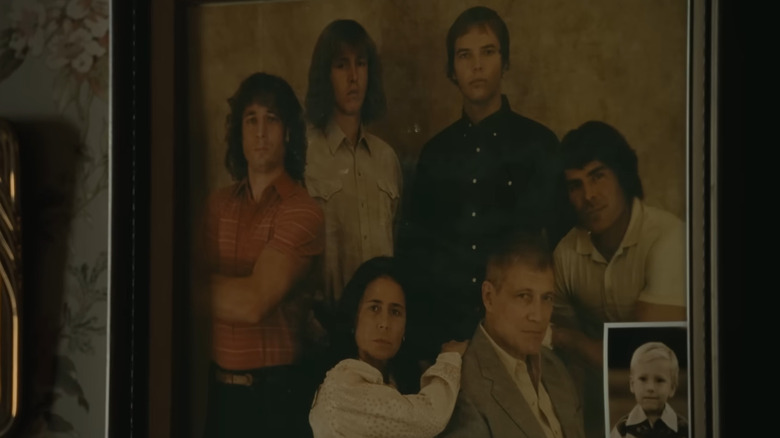The Ending Of The Iron Claw Explained
By the time the credits roll on "The Iron Claw," audiences will have experienced the rise and fall of the Von Erich professional wrestling dynasty. It is a tragedy so Shakespearean that they'll struggle to believe it happened, and they'll likely be further stunned to find out that the true story was seemingly pared down to make it dramatically credible. Just before the WWE would launch professional wrestling to new heights of popularity, retired wrestler Fritz Von Erich (Holt McCallany) makes one last play to wrest the World Heavyweight title — and by extension, the future of the sport — from the hands of the power brokers that rule his life and into the hands of his four sons.
There's Kevin (Zac Efron), the eldest living brother and heir apparent to the Von Erich wrestling legacy; David (Harris Dickinson), the patient glue holding the family together as he waits for his time in the ring; Kerry (Jeremy Allen White), the genuine star-athlete of the family and an Olympic hopeful; and Mike (Stanley Simons), the baby of the family who would rather spend his days writing music. As the family grapples with unimaginable loss, professional aspirations, and the so-called "Von Erich family curse," the most costly battle of all will be the fight to overcome the competitive spirit that truly haunts the ill-fated family. Join us as we take a look at the ending of "The Iron Claw."
What you need to remember about the plot of The Iron Claw
The cracks in the family begin to show during a fight between Kevin Von Erich and Harley Race (Kevin Anton). After getting accidentally knocked out of the ring and thrown onto the concrete floor, David — Kevin's newly minted tag-team partner — emerges from the stands to defend his brother and delivers a rousing post-match speech that cements him as the new rising star. As Kevin watches, helplessly eclipsed in the scrutinizing eyes of their father Fritz, it's clear that this family rivalry will breed nothing but conflict outside the ring.
Even after Kevin and David become a threesome with would-be Olympian Kerry, David remains his father's obsession and is pushed to his limit as he pursues the Championship title. Tragically, however, he dies of acute enteritis before the match can take place. A coin flip determines Kerry will compete for the title in his place — only for his career to come to a sudden halt after a motorcycle accident takes one of his legs. At Fritz's command, Kevin trains a reluctant Mike as his new partner. When Mike dislocates his shoulder and undergoes surgery, complications cause him to lose the ability to communicate as he once did. Having suffered so much tragedy, Kevin becomes convinced that the Von Erich curse is responsible, and begins hiding from his wife and newborn child as a result.
What happened at the end of The Iron Claw?
Unable to even play guitar after his surgery, Mike dies by suicide. Despite their grief, Kevin agrees to a championship fight against Ric Flair (Aaron Dean Eisenberg). While performing the family's signature move — the "Iron Claw" — Kevin injures Flair and is disqualified. Following this, Kevin takes a more passive role and focuses on being a better husband and father.
Kerry, meanwhile, has resumed performing with a prosthetic leg and is now a prominent part of the burgeoning WWF. Due to the overwhelming pain of competing, he becomes reliant on opioids. Before long, the WWF begins reducing his role in the franchise, and a distraught Kerry calls Kevin to express his feelings of hopelessness. Kevin tells Kerry to meet him at their parents' house and urges Fritz to check in on Kerry, but Fritz dismisses his concerns, asking not to be involved.
Kevin arrives at Fritz's home and finds Kerry's body next to a gun Kerry bought as a Christmas gift for their father. As he grieves, Kevin imagines Kerry reuniting with David, Mike, and their late kid brother Jack. In the aftermath of Kerry's death, Kevin sells the family wrestling business despite his father's warning that he'd disown Kevin if he did. As Kevin watches his children play together, he weeps — his children comfort him, and reassure him that they'll be his new family.
If you or someone you know is struggling or in crisis, help is available. Call or text 988 or chat 988lifeline.org
The real curse was Fritz Von Erich
Driving much of the tension at the heart of "The Iron Claw" is Kevin Von Erich's growing anxiety that he and his brothers are doomed by a family curse. As each member experiences hardships and apparent misfortunes, it becomes increasingly clear that the real force behind the family's struggles is Fritz Von Erich.
Each Von Erich brother who passes away before the film's end does so as a direct consequence of Fritz's obsessive need to dominate the professional wrestling industry. David is pressured by his father to push through an obvious illness to compete. Mike's dream of being a musician is openly derided by Fritz, and his insistence on Mike joining the wrestling team is ultimately what robs Mike of his ability to do what he truly loves. Then — after Kevin is disqualified from his match against Ric Flair — Kerry takes on the full burden of their father's aspirations, yet is abandoned by his father when the weight of those becomes unbearable.
Only Kevin can escape Fritz's toxic influence, though it took the deaths of his brothers for him to finally do so. By selling the wrestling business and violating Fritz's wishes, he effectively severed contact between them, ensuring that Fritz's rage and bruised pride would prevent him from reaching out. In this way, Kevin was finally free of the true family curse and allowed to live in peace with his new family.
It is about breaking the cycle of paternal abuse
"The Iron Claw" can be viewed as a metaphor for the dangers of hyper-masculine gender roles and expectations. Though the pressure Fritz Von Erich inflicted on his children was ostensibly in the pursuit of turning the family into a dominant wrestling dynasty, this goal — and the various quietly horrific ways he pursued it — is steeped in the baggage of toxic masculinity. Kevin's journey toward healing is also intertwined with him unlearning what his father taught him while taking active steps to raise his children with a healthier understanding of masculinity.
Director Sean Durkin chooses what aspects of Kevin's life he focuses on during the sequence following his disqualification very intentionally. He's shown walking his children home from the bus stop, taking care of them after school, and preparing dinner for the entire family — including his wife, Pam (Lily James). Having begun to free himself from the world of wrestling, he's taken on a less traditionally masculine role that provides for his family in ways his father didn't.
This idea of breaking down traditional masculinity comes to a head in the final scene, which sees Kevin fully shed his stoicism and break down in front of his children. But rather than see this show of emotion as weakness, his children accept emotion as a natural part of life — likely because Kevin has modeled this behavior for them.
The different depictions of marriage and gender roles
Kevin and Pam's relationship dynamic is juxtaposed against Fritz and Doris' (Maura Tierney) more traditional marriage. As the Von Erich children experience further hardship due to their father's obsession, we learn that Doris once enjoyed painting. We never actually see her paint until after Kerry's death and Kevin's estrangement, when she appears at an easel in her kitchen, seemingly disinterested in Fritz. Doris' lost love of painting could be seen as a metaphor for how she shrunk parts of herself to be Fritz's wife — parts of herself that she then allowed herself to explore after losing faith in him.
This would certainly be an interesting perspective to consider in contrast to Kevin and Pam's marriage, which is clearly defined with space for both of them to grow equally. On their first date, Pam asserts that she aims to have a veterinary practice and that she only desires to be with someone who could handle her having that much agency and ambition — Kevin not only agrees but seems enchanted by her passion. He stands behind his words later in the film, when he takes on the role of stay-at-home parent so that Pam can focus on her career. While the romantic relationships take a backseat to the fraternal drama "The Iron Claw" focuses on, it's nonetheless another example of Kevin surviving because he chooses to wield his masculinity in opposition to his father.
Wrestling as a metaphor for performative masculinity
Though wrestling was already an integral part of the Von Erich story, it serves a symbolic purpose in the film as a metaphor for performative masculinity — the way young men might take on certain traditionally masculine traits inauthentically to be seen as a "real man." For example, a young boy who would otherwise prefer a sensitive hobby — like, for example, writing and playing music — may feel societal pressure to lift weights and play sports to avoid ridicule and earn respect, as seen in Mike's story.
During his match with Harley Race, Kevin gets tossed around more than anyone expects. But the true failure in his father's eyes was Kevin's inability to catch his breath and deliver a strong post-fight monologue. For the audience, for the decision makers setting fights, and for Fritz, what mattered most was not Kevin's athletic ability, but his ability to absorb pain without betraying "weakness." This idea is driven further by the fact that David — who executes a mere fraction of what Kevin did physically — essentially secures a championship fight by taking over Kevin's post-fight monologue with the strength and machismo of a man who wasn't just suplexed into a concrete floor.
This isn't to say that "The Iron Claw" equates wrestling with toxic masculinity, however, and it takes steps to subvert this idea entirely.
Wrestling was never the problem
Aside from the fact that Ric Flair was a significant player in the real Von Erich saga, his presence in the film serves to dramatically support the idea that — as wrestling evolved into the late-20th and early-21st centuries — the idea of masculinity had become far less rigid than the Von Erich's Conan-esque personas. Kevin's final match visually juxtaposed his subdued, subtle costume with the loud and flamboyant attire of Flair, who regularly entered the ring wearing pink robes and fur boas.
It would be a great labor of historical revisionism to paint Flair as some harbinger of gender fluidity in the WWE, and Sean Durkin has avoided doing so. But Flair's presence in the film as the pink-clad pinnacle of wrestling certainly undermines the constrained, stoic image Fritz Von Erich forced upon his sons. Professional wrestling was not what held the Von Erich brothers back, but rather the relationship their father built between their worth as men and their futures as wrestlers. Kevin seemingly recognizes this in the film, as he agrees to continue wrestling even after selling the business and separating himself from his father. Without Fritz, perhaps Kevin can define his relationship with the sport as a job — not a measure of his manhood.
The importance of David's death
Tackling masculinity is an undoubtedly difficult task in an age where there are countless voices — from social media influencers to politicians — force-feeding young men arbitrary yet harmful dictums on the subject. As a consequence, many viewers will likely have varying ideas about what it means to be a "real" man, which will certainly lead to a wide variety of interpretations. It isn't hard to imagine someone beholden to traditional definitions of masculinity and strength walking away from "The Iron Claw" with the notion that the Von Erich brothers simply weren't strong enough to survive the high-pressure world of professional wrestling. This is why the death of David Von Erich is such an important part of understanding this story.
David embodied nearly every characteristic one would associate with traditional masculinity. He was physically strong, mentally tough, resilient, and stoic in the face of adversity. And yet, despite all this, it was because of this strength that he forced himself to push through his illness — that he, like his brothers, fell victim to the pressures forced upon him by his father. Though David, Kerry, and Mike all displayed different types of masculinity, they couldn't absorb such constant abuse without consequence. Whether said consequences manifested in death by suicide or ruptured intestines, they were the result of a lack of emotional support, not a lack of strength by any definition.
The weapon Kerry uses is revealing
Another misconception it's easy to get wrapped up in while analyzing "The Iron Claw" is the erroneous idea that the Von Erich brothers' relationship with their father in the film is entirely negative. Though Fritz Von Erich is unquestionably depicted as being emotionally abusive to a fatal degree, his children do seem to genuinely love him. It's arguably the importance they place on their father's opinion of them that makes Fritz's abuse so deadly, as is evidenced by the weapon Kerry uses in his death by suicide.
One of the more bizarre scenes in Sean Durkin's film involves a slightly manic (and perhaps intoxicated) Kerry blowing into Christmas dinner at the Von Erich household during his wildly successful run in the WWF. He gifts his father a very fine pistol and immediately tries to get him to try it out in the backyard — the nature of his request quickly devolves from excited to anxiously forceful. Several scenes later, Kerry is discovered dead next to the weapon.
The entire sequence of Kerry giving his father the gun arguably imbues the weapon with Kerry's apparent need for his father's approval and affection. The fact that Fritz isn't so overwhelmed by happiness at receiving the gift that he runs outside to use it wounds Kerry to an extraordinary extent — and it's surely no coincidence that the scene emphasized the weapon as the instrument of his death.
The meaning of the title
The ultimate symbol that unites the insidious trap of traditionally masculine gender roles and the ruthlessly competitive legacy of Fritz Von Erich is the titular Iron Claw, the eponymous wrestling finisher cultivated by Fritz and passed down — like an heirloom or curse — to his four sons. Throughout the film, as we see the brothers training for and competing in professional wrestling matches, we see them execute their father's signature move, in which they grab their opponent's head with one hand and squeeze as though their inhuman strength were capable of crushing a man's skull should he be foolish enough not to tap out.
On several levels, the Iron Claw is the perfect encapsulation of everything that ails the Von Erich wrestling dynasty — the forced performance of masculinity and strength, the exertion of immense physical and mental pressure, and the burden of carrying Fritz's aspirations. Like the move itself, these are all struggles that are passed from Fritz to his sons, infecting them as Kevin believes the Von Erich curse has. But the name itself, as well as the image it evokes of an unbreakable grasp, further summarizes the seemingly inescapable grip of Fritz's influence.
What has the cast and crew said about the meaning of The Iron Claw
Director Sean Durkin has spoken at length about the themes that inspired him to write "The Iron Claw." As he told The Hollywood Reporter, he "wanted to tackle the sort of trappings of masculinity and the very toxic ideas about toughness and being a man and what they are and how to break those." This fight to break — or even just survive — the perverse and fatally toxic influence of traditional masculinity is quite evident in Durkin's portrayal of the Von Erichs, whose real-life story serves as a similar cautionary tale of emotional repression and abuse.
For star Zac Efron, it was incredibly important that his portrayal be as truthful to the Von Erich's experience as possible, his most important critic being the real Kevin Von Erich. "Over the course of filming this movie, [his opinion] was pretty much all I could think about," he told THR. Though Efron's performance perfectly supports Durkin's interrogation of traditional masculinity, his perspective as an actor is more personal and psychological. "There's a huge element of the movie that's, of course, about wrestling and the showmanship aspect," he told Entertainment Weekly. "But really, at its core, this movie's an incredible story about family, love, loss, and ultimately the triumph of a man who tries to break the cycle of this crazy curse."
How does the ending compare to the real story
As difficult as it may be to process, the unimaginably tragic events of "The Iron Claw" transpired almost exactly as they appeared on screen. David Von Erich died of acute enteritis in a hotel room in Tokyo, Japan, and his body was found by a referee who went to check on him after he didn't show up to a scheduled match. Both Mike Von Erich and Kerry Von Erich died by suicide under the same circumstances as their film counterparts, and Kerry specifically used a firearm he had purchased as a Christmas gift for Fritz Von Erich two years before.
The biggest alteration Sean Durkin made to the Von Erich tragedy for "The Iron Claw" was the omission of Chris Von Erich, the family's sixth and youngest brother whose story had to be cut entirely from the film due to time constraints. Chris died at the age of 21 in 1991, two years before Kerry, also by suicide from a self–inflicted gunshot wound at the family's farm. Kevin Von Erich, now 66 years old, is the sole surviving member of the Von Erich wrestling dynasty. According to Zac Efron, he has seen and approved of "The Iron Claw."
